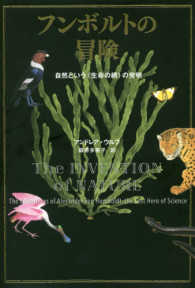- ホーム
- > 洋書
- > ドイツ書
- > Humanities, Arts & Music
- > Linguistics
- > romanic linguistics
Description
(Text)
Ce livre est écrit en langue russe. This book is written in Russian.
L'influence poétique et philosophique que l'héritage de Stéphane Mallarmé a exercée sur la vie littéraire russe au cours du 20e siècle et la destinée de son oeuvre en Russie sont restées ignorées du plus grand nombre. Au mieux, on ne les a jamais considérées de façon approfondie et systématique. En présentant le regard de la critique russe dans les articles consacrés au chef de file du symbolisme français, à la lumière des diverses traductions de son oeuvre poétique, l'auteur a une démarche véritablement novatrice: il présente Mallarmé vu et interprété par les Russes, et pratiquement incompris ou, en tout cas, mal compris. Ce livre, basé sur une très large documentation, explique cette non-réception. Une grande partie de l'ouvrage est consacrée à l'analyse des problèmes liés à l'interprétation textuelle. Tout en gardant à l'esprit le climat artistique dans lequel elles ont vu le jour, l'auteur montre les qualités et les faiblesses des traductions célèbres de Valéri Brioussov, Innokenti Annenski, Fiodor Sologoub, Max Volochine et Ilia Ehrenbourg.
Quant à l'effet indirect, exercé par l'oeuvre de Mallarmé sur la poésie russe et, en particulier, sur les oeuvres de Viatcheslav Ivanov, Ossip Mandelstam, Anna Akhmatova, Boris Pasternak, Vélimir Khlebnikov et tant d'autres, il s'agit plutôt d'un "reflet contrarié" que du développement logique d'une empreinte raisonnée. Or, cette influence, combinée à de nombreuses nouvelles traductions publiées dans les vingt dernières années, témoigne, malgré le mépris manifeste de l'ère soviétique, du regain d'intérêt des intellectuels russes pour cette période littéraire oubliée.
For the most part, the poetic and philosophical influence of Stéphane Mallarmé's work on the literary life of Russia during the 20th century has remained unknown, as has the fate of his own work in Russia. They have never been examined systematically or in any depth. The author demonstrates a highly novel approach to his subject by presenting the opinions of Russian critics from articles dedicated to the leader of French symbolism in the light of different translations of his poetry; he presents Mallarmé as seen and interpreted by Russians who had little or no understanding of him. The book, which draws on a vast amount of archival research, explains the reasons for this non-acceptance. Much of it is devoted to an analysis of the problems of textual interpretation. The author points out the qualities and weaknesses of well known translations by Valery Briussov, Innokenty Annensky, Fiodor Sologub, Max Voloshin and Ilia Ehrenburg, whilst conveying a sense of the artistic climate when these first appeared.
As far as the indirect influence of Mallarmé's work on Russian poetry is concern ed, particularly on the work of Viacheslav Ivanov, Ossip Mandelstam, Anna Akhmatova, Boris Pasternak, Velimir Khlebnikov and many others, this was more a "distorted reflection" rather than the natural development of a logical train of thought. In fact, his influence, together with the publication in the last 20 years of numerous new translations, demonstrate that, in spite of the obvious contempt of the Soviet literary establishment, there is a renewal of interest amongst Russian intellectuals in this forgotten literary period.
(Review)
"Die vorliegende Arbeit ist die erste systematische Untersuchung der Rezeption des Werkes von Stéphane Mallarmé (1842-1898) in der russischen Kultur. Die Konzeption und der Aufbau des Buches erweisen sich als eine gelungene Synthese von deskriptivem und problemorientiertem Ansatz in der rezeptionsgeschichtlichen Forschung. Der enorme Kenntnis- und Faktenreichtum und die Bemühungen um historische und textuelle Präzision verbinden sich hier mit einer souveränen Beherrschung des Materials, dessen Anordnung nicht nur durch Logik und Übersichtlichkeit besticht, sondern auch für eine recht spannende Lektüre sorgt. [...] Das Buch von R. Dubrovkin bildet somit einerseits einen wertvollen Beitrag zur Untersuchung der russisch-französischen kulturellen Beziehungen, andererseits wird es aber sicherlich einen wichtigen Platz in der Literatur zum russischen Symbolismus einnehmen." (Ida Junker, Zeitschrift für Slavische Philologie)







